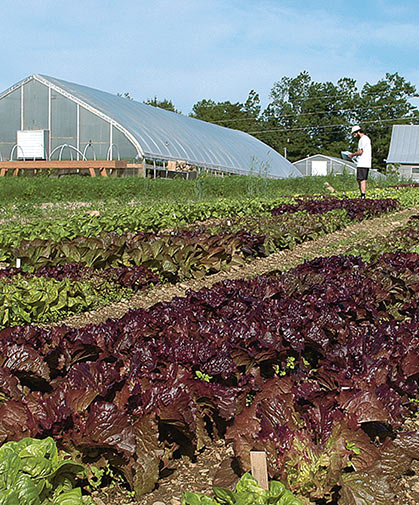- Baby Leaf Greens & Baby Leaf Lettuce | Technical Production Guide
- Growing Salad Gardens: An Ultimate Guide by Niki Jabbour | Johnny's Webinar Series
- Baby Leaf Lettuce | Variety Comparison Chart (PDF)
- Full-size Leaf Lettuce Varieties | Comparison Chart (PDF)
- Lettuce | Full-Head Varieties | Comparison Chart / Planting Program (PDF)
- Lettuce | Key Growing Information
- Lettuce Varieties | Quick-Reference Comparison Chart (PDF)
- Full-Size Romaine (Cos) Lettuce Varieties | Comparison Chart (PDF)
- Individual Salanova® Varieties | Comparison Chart (PDF)
- Salanova Lettuce | Tech Sheet (PDF)
- Growing Mini Versus Full-size Head Lettuce | A Look at the ROI
- Pelleted Lettuce | Key Growing Information
- Salad Mixes & Microgreens Mixes | 2-pp Spec Sheet (PDF)
- Salanova Lettuce | Cutter Tool | Tech Sheet (PDF)
- Salanova Variety & Collection Specifications | 4-pp Brochure (PDF)
- Video: Baby Leaf Harvester for Greens, Mesclun, Spinach, Lettuces & Tender Aromatics
- Video: How to Grow Lettuce • From Seed to Harvest
- Video: Beat the Heat: Lettuce & Greens for Southern Growers | Johnny's Webinar Series
- Video: Salanova Lettuce | Growing, Preparing & Marketing
- Webinar Slide Deck | Lettuce & Greens for Southern Growers | PDF
- Baby Leaf Greens: 12 Picks for Market Growers | Johnny's Educational Webinar Resources
- Lettuce & Greens for Southern Growers | Johnny's Educational Webinar Resources
- Video: Baby Leaf Greens: 12 Picks for Market Growers | Johnny's Webinar Series
- Video: The Advantages of Salanova® Lettuce | Johnny's Selected Seeds
- Video: High-Value Crops & Varieties for Your Garden • Tutorial with Niki Jabbour
- Prismatic Mini-Head Lettuce Mix from Johnny's
- Webinar Slide Deck | One-Cut Lettuces: Insights & Techniques for Small Farms | 60-pp PDF
- Lettuce | Full Head Varieties | Succession Planting Program
- Video: One-Cut Lettuces: Insights & Techniques for Small Farms | Johnny's Webinar Series
- Growing Salad Gardens: An Ultimate Guide by Niki Jabbour | Johnny's Webinar Series
- One-Cut Lettuces | Johnny's Educational Webinar Resources
- 'Bigelow' Organic Mini-Head Lettuce Variety
- How to Choose & Grow the Best Lettuce | Tips for Every Grower
- Winter Growing Guide | Part 6: Recommended Crops & Varieties
- ‘Pint Size’ Mini-Head Iceberg Lettuce Variety
- Kolibri: Mini-Head Bibb Lettuce Variety
Pelleted Lettuce - Key Growing Information

SCIENTIFIC NAME:
Lactuca sativaCULTURE:
Lettuce is a hardy, cool-weather crop and can be planted with your earliest worked soil. It grows best at 60–65°F (16–18°C) and germinates best below 70°F (21°C), so careful variety selection is key for success in hotter weather. Sow every 2–3 weeks for a continuous supply of either full heads or salad mix.PELLETED SEED:
Pelleted seed requires a little extra attention when it comes to watering, as it performs best with consistent, moderate soil moisture throughout the germination period. An initial watering will split or dissolve the pellet, but if the soil is allowed to dry out before the germination period is over, the seed may receive insufficient moisture for optimal germination.PELLET STORAGE:
Pelleting offers many advantages, but the pelleting process also shortens the shelf life of the seed. We recommend using pelleted seed within one year of purchase. If you need to store pelleted seeds until planting, protect them from heat and humidity in a cool, dark, dry place. If you prefer to store your seed in the refrigerator, be sure to place the seed in an air-tight container to protect it from fluctuations in humidity.THERMAL DORMANCY:
Lettuce seed can enter thermal dormancy when exposed to high temperatures. Optimum germination results at soil temperatures of 60–68°F (15.5–20°C). The priming process in pelleted lettuce seeds broadens the temperature range in which the seeds will germinate, overcoming some of their thermal dormancy.TRANSPLANTING for HEAD LETTUCE: 3–4 weeks before field planting, sow in 128-cell trays barely covered with vermiculite or fine soil. If necessary, utilize shade and frequent misting to keep trays cooled below 75°F (25°C) during germination. Young plants properly hardened at least 3–5 days before planting can survive temperatures as low as 20°F (-6°C). Transplant iceberg, romaine, and butterhead lettuce 10–12" apart in rows 15–18" apart, other types 8–10" apart in rows 12–18", and mini heads as close as 6" in a grid.
DIRECT SEEDING for BABY LEAF: Seeds can germinate well in soils as low as 40°F (4°C) but often poorly above 75°F (24°C). Sow 4–6 seeds/inch in rows at least 2" apart. Cover lightly to 1/8" and firm gently. Dry soil must be watered to ensure coolness and moisture for uniform germination.

